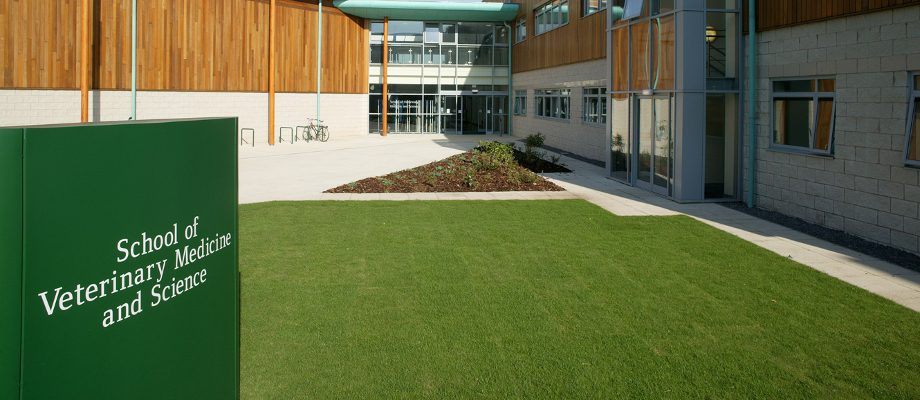
Nottingham Veterinary School to double student numbers in innovative dual-intake move
March 6th, 2019
The School of Veterinary Medicine and Science has unveiled ambitious plans to increase its student numbers by moving to a two-intake system in the new academic year.
The expansion will see 150 undergraduate students starting at the school in September this year, followed by a further 150 beginning their courses in April 2020.
The move to increase the number of high-quality vet graduates comes at a crucial time for the industry in the UK which is experiencing a shortage of qualified vets, with the situation expected to worsen post-Brexit.
Foundation Dean, Professor Gary England said: “As a UK leader in veterinary education, we’re extremely proud of the quality of the innovative programme which we offer to our students and the calibre of graduates it produces.
“Our team of dedicated and entrepreneurial staff is delighted that a move to a dual intake will open up this fantastic opportunity to many more students without increasing group sizes and while maintaining the excellent student experience which is synonymous with Nottingham.”
The school – which has been consistently ranked top for student experience in the National Student Survey (NSS) since its first graduating cohort in 2011 – will deliver its cutting-edge RCVS-accredited degree courses to a double intake by introducing an innovative approach to the teaching timetable, which will make best use of the school’s services and facilities across the whole of the year, rather than sticking to the traditional academic terms.
Based at the university’s Sutton Bonington campus, the school will be increasing its staff, with plans for a number of new clinical roles. This will enable the School to deliver small class sizes and protect the school’s inspirational student-centred experience.
Students’ final year already runs across the full calendar year and they will continue to access hands-on, real-world clinical skills through intra-mural rotations at the school and with its network of partnerships with privatevet practices, veterinary hospitals and organisations including amongst others the Scarsdale Veterinary Group, Oakham Veterinary Hospital, Defence Animal Centre, the RSPCA and PDSA.
The move will almost double the number of Nottingham veterinary graduates coming on to the jobs market every year at a time when the veterinary industry is facing unprecedented challenges.
Figures from the RCVS show that almost one-third of non-UK EU vets are already considering moving back home and that 18 per cent are actively seeking work outside the UK because of concerns about the possible effects of Brexit.
At the BCVA Congress in November last year, UK Chief Veterinary Officer, Christine Middlemiss confirmed to delegates that the UK is experiencing an 11 per cent shortfall in existing vet numbers with an estimated 200 per cent increase in the need for certification for food exports in the run-up to Brexit.
Pro Vice Chancellor and Dean of the Faculty of Medicine and Health Sciences, Professor John Atherton said: “The UK needs more vets and I am delighted that we will train more here in Nottingham.
“The Nottingham veterinary course is the most popular in the country and the vets we train are the most sought-after in the workplace. Our expanded course is designed to make the experience of becoming a vet in Nottingham – already one of the best vet training experiences in the UK – even better.”
The benefits for students who join Nottingham will include:
- The chance to experience its inspirational student-centred approach, ranked top by the National Student Survey (NSS)
- High staff-to-student ratios, with each cohort only being 150 students in total. This means students will benefit from smaller sized teaching groups, increased hands-on practical learning and staff knowing them better as an individual
- Opportunities to develop the skills, qualities, and knowledge to prepare students for a high-value career as a veterinary surgeon, and be the first choice for prospective employers
- Development of practical and clinical skills and knowledge through the addition of cross-module teaching weeks
- Options to track within the course to ensure students are excellently prepared for future employment
- Less competition for EMS places – four weeks of EMS per year will now be delivered within the curriculum for both cohorts, which will improve work-life balance, and give better opportunities for students to gain employment or rest between terms. The April cohort, will undertake vacation EMS while other students are in term-time
- A mini ‘gap-year’ between school and starting university for students starting in the April cohort
Leave a Reply
Other
Trusted Research update: changes to technologies requiring an export control licence
The UK Government has issued an updated UK Strategic Control List, introducing additional export control measures […]

Adelaide-Nottingham Alliance: join Vice-Chancellors at event celebrating global partnership
Staff, students and researchers are invited to join the Vice-Chancellors of the University of Nottingham and […]

